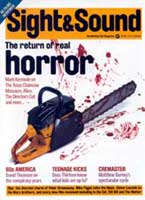
Killing Me Softly

A fairytale-like exploration of love and death set in Glasgow, Wilbur Wants to Kill Himself plays like a Scottish Jules et Jim. By Geoffrey Macnab
"When you were dead, what was it like?"
"Dull as ditchwater... there's nothing. Just blackness and utter silence. It's like being in Wales."
Wilbur (Jamie Sieves), the Glaswegian protagonist of Wilbur Wants to Kill Himself, may be determined to take his own life, but he's also personable and engaging, a womaniser who's good with kids and always ready with mildly sarcastic repartee. It's typical of his gallows humour that he can't describe his latest suicide attempt without throwing in a dig at the Welsh.
And what's so disconcerting about Wilbur the film, Danish writer-director Lone Scherfig's first in English, is that despite its ostensibly grim subject matter, it plays like a comedy. The main setting is North Books, a musty second-hand bookshop owned by Wilbur's relentlessly optimistic brother Harbour (Adrian Rawlins). One of his regular customers is Alice (Shirley Henderson), a cleaner working nights wiping up blood and mucus at the local hospital. She sells Harbour the books she picks up from dying patients. When she loses her job, the ever-gallant, ever-cheerful Harbour ends up marrying her. He's devoted to her precocious 11-year-old daughter Mary (Lisa McKinlay) and they'd be a happy family if it weren't for Wilbur's incessant suicide attempts. And there's an added complication: Harbour is oblivious to or has chosen to ignore the obvious attraction between his new wife and his suicidal younger brother, whom she meets when she saves him from hanging. Indeed, Harbour is so devoted to his sibling you half guess he'd encourage the affair if it made Wilbur happy and stopped him from trying to knock himself off.
Wilbur is deeply immature. Scherfig admits that when her psychologist husband first saw the film he was exasperated by the young lead's wilful behaviour. "My husband reacted like a lot of people do, saying, 'Why is he so childish, why won't he grow up?'" It's a testament to Jamie Sieves' performance that we don't take against this most self-indulgent of characters. He underplays, treating each of Wilbur's suicide attempts in a matter-of-fact way, as if killing himself is some sort of domestic chore he hasn't yet mastered. Adrian Rawlins is equally laidback as Harbour. There are touches of melodrama here - the final hug between the brothers, a sequence in a snow-filled graveyard - but neither Scherfig nor her cast is much interested in big emotional set-pieces. Grief is treated in surprisingly discreet fashion.
Rawlins, who was talent-spotted by Lars von Trier's girlfriend when he was playing a bit part in the television cop series The Bill and was subsequently cast in Breaking the Waves, acknowledges that Scherfig's approach was always low-key. "But Jamie Sieves, Shirley Henderson and myself are all quiet people... we didn't need to make a great effort to show we were bonding. There was a gentle intimacy about the whole way the film was set up."
Scherfig, he suggests, was determined to "make the audience do some of the work." The script is deliberately unemotional, without characters wailing or breaking down in hysterics, whatever straits they're in. "That's the beauty and dignity of the film," Rawlins suggests. "It has a light touch. It straddles tragedy and humour very delicately. In the wrong hands, it could have been a heavy piece."
On one level Wilbur can be seen as a deadpan, northern European answer to Truffaut's Jules et Jim, with Alice as the woman caught between two men. She starts the film as if she's so numbed by grief and boredom her feelings have ossified. Her one concern is her young daughter, whom she's helped to save several thousand pounds for the "rainy day" she's sure will come. Scherfig deliberately withholds her backstory: we don't know who fathered her child or what she did before she took her dead-end job in the hospital. For the brothers, she's like a fairytale princess. She lightens the oppressive atmosphere at North Books while they help prise her from her shell.
The challenge for the director was not to allow the film to drift into whimsy or mawkishness. After all, the subject matter is very grim. The observational humour and dryly sardonic one-liners can't disguise the themes of cancer, suicide and bereavement. Indeed death, in one form or another, underpins almost every scene. We hear Harbour reminiscing about his (not so long dead) father. Wilbur's enthusiasm for suicide stems, it is inferred, from his conviction that his father never really loved him. We see Wilbur sitting in a suicide-recovery group, where various other malcontents struggle to think of reasons to stay alive. Even the minor characters have had their brushes with death: gloomy Danish psychiatrist Horst (Mads Mikkelsen) is still sore at his father for having his dog put down. ("If only my dog had been ill, I would have been able to understand it.") When Harbour is busy cooking roast duck in the kitchen, it takes a moment or two to realise he's gathering up the various implements to stop Wilbur from using them to slit his wrists.
Wilbur's suicide attempts invariably end in bathos. When he jumps into the river the water is too shallow. When he tries to hang himself he ends up with such a badly injured neck he has to wear a bandage that makes him look like a medieval doge. The central irony is that while he can't cast off life, however hard he tries, his brother - who cherishes it - struggles to hold on to it.
Scherfig's previous film Italian for Beginners (2000), made under Dogme rules, played similar games with narrative and audience expectation. Set in a dead-end Danish town, it was a tale of six losers who find relief from their depressing and dysfunctional lives by enrolling for Italian lessons. To Scherfig's surprise, the film (a Silver Bear-winner at the Berlinale) was treated by critics and audiences as a romantic comedy. Wilbur is even darker thematically, but likewise uses comedy at incongruous moments. Ultimately it seems more akin to a fairytale than to a psycho-drama about death.
"I just thought that the next logical move after Italian for Beginners would be to get closer to the characters and to put them in more serious situations," Scherfig says. So she and her co-screenwriter Anders Thomas Jensen took a "mechanical" approach to their task. "All the characters are constructed from a view on life. Moira the nurse sees herself as put on this Earth because she has a mission and it's very important that she's here. The psychiatrist Horst has the inner conviction that life is not worth living. Harbour lives for others and through others. Alice is almost dead. She doesn't have a life.... It's a very good routine for sorting out a script. Then you add all the spark and all the fun."
The film was shot on location in Glasgow and at the Zentropa studios in Denmark. The Danes were initially sceptical about one of their most prominent directors making an English-language film in Scotland. ("They feel I'm like some of our football players - suddenly playing for Glasgow Rangers!") Nonetheless, this is only one of a growing number of Scottish-Danish co-productions being hatched.
Whether or not Wilbur offers an accurate portrayal of life in present-day Glasgow, it avoids what Scherfig calls the "Scottish clichés of people drinking and swearing and having rotten teeth." Looking back, she wonders if she strayed just a bit too far from street-level realism. "But I can forgive myself for all this romance by saying that I could only make this film because Ken Loach has done all the work he has done and Irvine Welsh has written Trainspotting. I had the privilege of serving the dessert."
